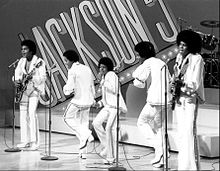This Black Social History is design for the education of all races about Black People Contribution to world history over the past centuries, even though its well hidden from the masses so that our children dont even know the relationship between Black People and the wealth of their history in terms of what we have contributed to make this world a better place for all.
Sunday, 21 April 2013
BLACK SOCIAL HISTORY : MICHEAL JACKSON : THE EARLY YEARS AND THE BIRTH OF A BLACK LEGEND : INTERNATIONALLY ACCLAIMED BLACK SUPER STAR :
Michael Jackson was born on August 29, 1958, in Gary, Indiana. He was the eighth of ten children in an African American working-class family who lived in a 3-room house in Gary, an industrial city near Chicago. His mother, Katherine Esther Scruse, was a devout Jehovah's Witness, and his father, Joseph Walter "Joe" Jackson, was a steel mill worker who performed with an R&B band called The Falcons. Jackson had three sisters: Rebbie, La Toya, and Janet, and five brothers: Jackie, Tito, Jermaine, Marlon, and Randy. A sixth brother, Brandon, who was a twin of older brother Marlon, died shortly after birth.
Jackson had a troubled relationship with his father, Joe. Joseph acknowledged in 2003 that he regularly whipped Jackson as a boy. Jackson stated that he was physically and emotionally abused during incessant rehearsals, though he also credited his father's strict discipline with playing a large role in his success.[ Jackson first spoke openly about his childhood abuse in an interview with Oprah Winfrey, broadcast in February 1993. He admitted that he had often cried from loneliness and he would vomit on the sight of his father. Jackson's father was also said to have verbally abused Jackson, saying that he had a fat nose on numerous occasions. In fact, Michael Jackson's deep dissatisfaction with his appearance, his nightmares and chronic sleep problems, his tendency to remain hyper-compliant especially with his father, and to remain childlike throughout his adult life are in many ways consistent with the effects of this chronic maltreatment he endured as a young child.
In an interview with Martin Bashir, later included in the 2003 broadcast of Living with Michael Jackson, Jackson acknowledged that his father hurt him when he was a child, but was nonetheless a "genius", as he admitted his father's strict discipline played a huge role in his success. When Bashir dismissed the positive remark and continued asking about beatings, Jackson put his hand over his face and objected to the questions. He recalled that Joseph sat in a chair with a belt in his hand as he and his siblings rehearsed, and that "if you didn't do it the right way, he would tear you up, really get you".
In 1964, Michael and Marlon joined the Jackson Brothers—a band formed by brothers Jackie, Tito, and Jermaine—as backup musicians playing congas and tambourine. Jackson later began performing backup vocals and dancing. When he was eight, Jackson began sharing the lead vocals with his older brother Jermaine, and the group's name was changed to The Jackson 5. The band toured the Midwest extensively from 1966 to 1968, frequently performing at a string of black clubs known as the "chitlin' circuit", where they often opened stripteases and other adult acts. In 1966, they won a major local talent show with renditions of Motown hits and James Brown's "I Got You (I Feel Good)", led by Michael.
The Jackson 5 recorded several songs, including "Big Boy", for the local record label Steeltown in 1967, before signing with Motown Records in 1968. Rolling Stone magazine later described the young Michael as "a prodigy" with "overwhelming musical gifts," writing that he "quickly emerged as the main draw and lead singer." The group set a chart record when its first four singles ("I Want You Back", "ABC", "The Love You Save", and "I'll Be There") peaked at number one on the Billboard Hot 100. Between 1972 and 1975, Michael released four solo studio albums with Motown, among them Got to Be There and Ben, released as part of the Jackson 5 franchise, and producing successful singles such as "Got to Be There", "Ben", and a remake of Bobby Day's "Rockin' Robin".
The Jackson 5 "became a cutting-edge example of black crossover artists... five working-class black boys with afros and bell bottoms, and they really didn't have to trade any of that stuff in order to become mainstream stars."
The group's sales began declining in 1973, and the band members chafed under Motown's strict refusal to allow them creative control or input. Although they scored several top 40 hits, including the top 5 disco single "Dancing Machine" and the top 20 hit "I Am Love", the Jackson 5 left Motown in 1975.
Subscribe to:
Post Comments (Atom)









































No comments:
Post a Comment